I Took My Parents and 10-month-old Baby on Our Dream Train Trip Through Europe
On a multigenerational family train journey, a new mother realizes the time to take your "someday" trip is now.
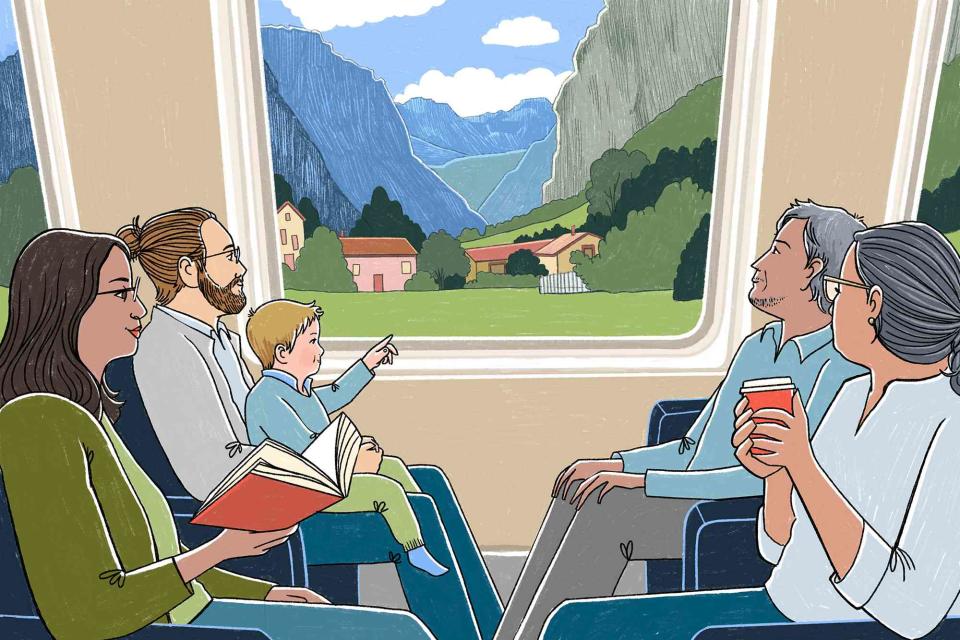
Corinne Mucha/Travel + Leisure
After spending the pandemic on separate continents — two and a half years during which our baby, my parents’ first grandchild, grew from a blinking newborn into a three-toothed agent of chaos — my family was determined to be together. Could there be a more beautiful way to do this than a train journey? Our route — from Venice to Como, then over the Swiss border to Zermatt, Wengen, and Zurich — was bold, linking places my parents had seen only in Bollywood movies and travel shows on television, places I had never dared to believe I would set foot in until a few years ago, when I first visited Switzerland and knew I had to bring my parents there. We had waited anxiously for visas, submitting bank statements, flight reservations, even personal letters of invitation from my father-in-law in Slovakia, whom we would visit after Switzerland. Then, in some disbelief, we all arrived in Europe. It was my parents’ first time on the Continent.
At the end of a few days in Venice — enchanting, from its green canals, despite their occasional smell of sewage, to the Rialto Market, where we browsed zucchini flowers and fresh octopus — we took a vaporetto to the train station. Immediately, the baby’s stroller, too wide for the luggage racks, was a problem. We tried to park it in this corner and that, until an older woman beckoned and leaned it next to her. The train crossed a long causeway over the water to the mainland, speeding past fields in which apartment buildings stood, looking out of place.
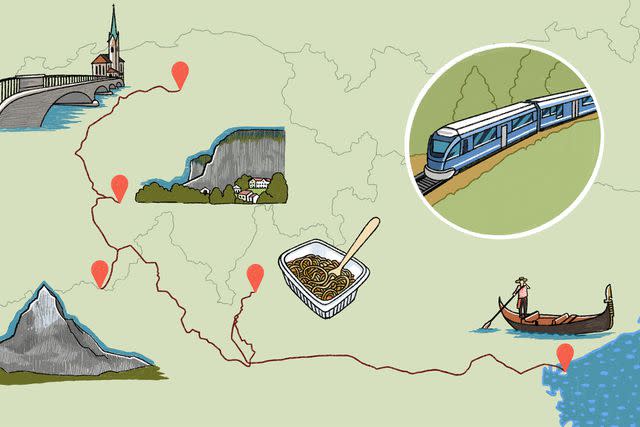
Corinne Mucha/Travel + Leisure
Though the three generations had never traveled together, we found our rhythm with ease. My parents entertained the baby, who clapped on the glass, laughed at the Bengali rhymes we sang to him, and threw his pink hippo under our neighbors’ feet. When he grew sleepy, my husband and I rocked him, using my fleece jacket as his blanket, then laid him across our laps and — quietly, as though he were a slumbering dragon — unwrapped our tramezzini, cheap and delicious triangular sandwiches made of crustless white bread stuffed with ham and egg or tuna and chopped olives.
Purchasing food for each leg of the journey was a ritual I savored. In Milan, where we transferred to a train for Como, the station’s prominent storefronts were occupied by Mac and Sephora — but where were the sandwiches? Tucked away, it turned out, in a shop with a long line, where I waited anxiously while the minutes of our transfer ticked away. I bought too much food — a rice and chicken bowl, a mango smoothie — as I found the role of caregiver reversed, me purchasing what my parents would eat. We did not typically speak about love, but we did say: The journey is long. You’ll be hungry. Eat.
Como turned out to be so crowded with visitors that no restaurant could seat us for my husband’s birthday dinner. In the end, we ate takeout cacio e pepe on the steps leading down to the lake, watching the sky turning glorious colors. My mother, accustomed from a lifetime of caregiving to heeding responsibility rather than having fun, took off her shoes and dipped her feet in the water as a duck swam by.
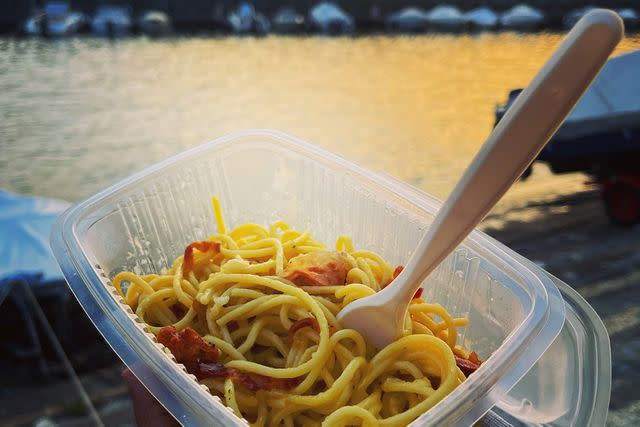
Megha Majumdar
When I was a child, we traveled plenty — but only within India. Those train journeys meant vendors who strolled down the aisles, selling salted cucumbers and lemon tea, travel combs and pocket mirrors, and magazines in scripts I couldn’t read. I would grip the window bars, their iron smell lingering on my palm, and watch the passing landscape, squares of stubbled farmland interrupted only by electricity poles and lone men pedaling bicycles. Inside the coach, a temporary society would form.
I remembered those societies on our train ride through Italy, when our baby grinned at strangers. Their kindness, as they picked up his toys from under their seats, or touched his tiny toes and made him laugh, gave us a few minutes of rest.
But when we crossed into Switzerland, officers appeared in the aisle, barking “Passport!” at us. It was nothing new for brown travelers like my parents and me, used to being supplicants before border authorities, but this time the demand was shorn of any disguise, aimed openly at the few passengers of color on the largely white coach. My schoolteacher mother and retired father, firmly in the Indian middle class, were slightly bewildered by the aggression of the officer, and answered question after question: Were they tourists? How much money did they have? The officer demanded that my mother open her purse to show the cash tucked inside. Meanwhile, many of the white passengers looked serenely at their phones, undisturbed. My white husband, who was working on his laptop some distance from us, was asked not a single question.
Long after the officers left, the wound remained. They were the racist profilers, but somehow we were the ones the humiliation clung to. We hid it under admiration of the mountains that rose in the windows — the Swiss Alps, which we had dreamed of seeing all our lives.
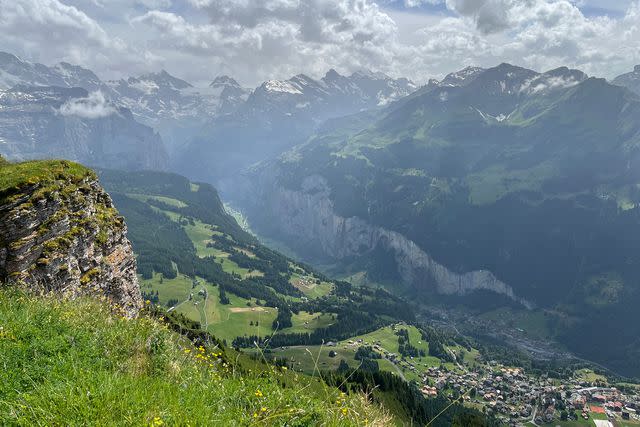
Megha Majumdar
In Zermatt, where we stayed overnight, the Matterhorn showed itself one day and hid behind clouds the next (“Just imagine it’s there,” we advised one another). I loved our next stop, Wengen, a stunning, traffic-free town perched above the green Lauterbrunnen Valley, near which loom the peaks of the Eiger, Mönch, and Jungfrau, white as poured milk. On a rainy day in Wengen, we watched clouds move above the valley floor, found mystery berries on branches that still held raindrops, and marveled at the cliff face above us turning volcano-red with the sunset, a sight that only occurs once or twice a year, according to a local walking his dog. How far we were from Venice’s maze of stone lanes, its canals chockablock with gondolas.
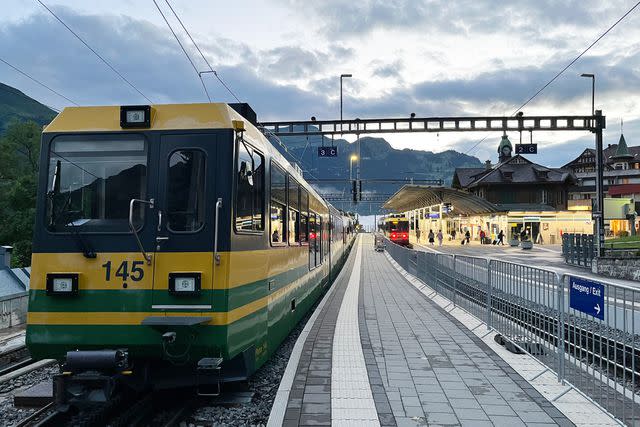
Megha Majumdar
That is part of the delight of our route — the range of places we could cover, from sea to mountaintop. We had selected each train ride to be three to four hours long, so that the baby wouldn’t go bananas. In the mountains, we sought opportunities to see astonishing sights that wouldn’t require strenuous hikes, as my mother’s knee gives her trouble. Switzerland’s network of cable cars and funiculars made it possible for us to see places like Glacier Paradise, Europe’s highest cable car station, which took us over a glacier that was lined like a human palm and blue like the depths of the sea, to a peak where the wind sought to snatch my phone from my hand. I took a picture of my dad, looking at the mountains with wonder.
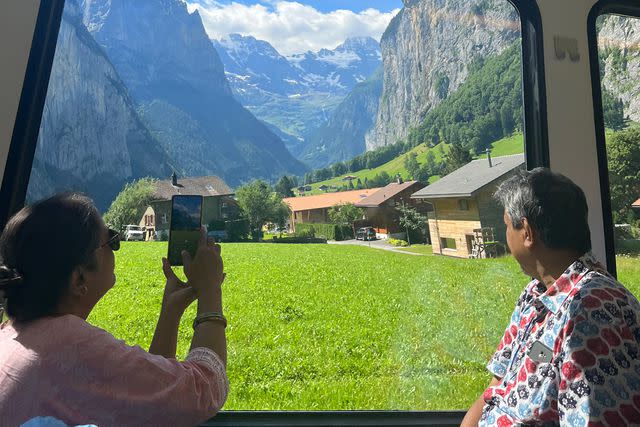
Megha Majumdar
Before we had a baby, time on trains used to be measured in pages read, the degrees of light changing outside the window. Now it was measured by every minute of the baby squirming and wiggling, unhappy at his containment, our attention to the view constantly challenged.
But that is a shortsighted reading of this chapter. The arrival of a baby reminds us of how finite our lives are — how close we move to death, a shadow cast on our sunniest days, or perhaps a sieve through which those days gain the finest meaning. Seeing the world before we die — isn’t that what a vacation is? — is a profound privilege.
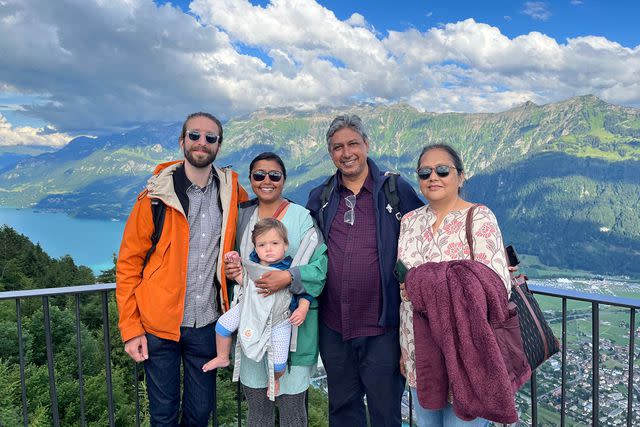
Megha Majumdar
In Zurich, we saw a stage being dismantled at the train station. I was sad to have missed the show, whatever it was, but charmed that one had taken place. It was summer, after all, and the first summer in which I felt that we were emerging from the overwhelming grimness of COVID and learning to live with its endless reality. We walked in the sunshine. Seeking a break from our diet of sausages, shawarma, and schnitzel, we ate delicious khao soi — a Thai coconut curry noodle soup — at Tiffins Asian Kitchen, in a quiet neighborhood of offices, while nearby a security guard tested doors and locks in the aftermath of, it seemed, an attempted break-in.
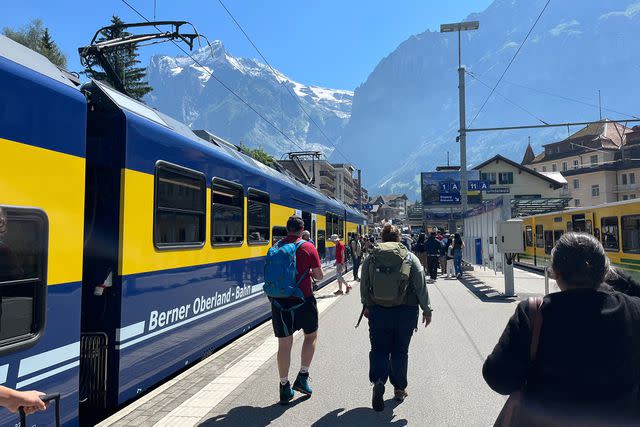
Megha Majumdar
Later, we strolled by the lake, where swans quarreled for torn bread and tourists knelt to take photos. We joined them — we were happy to be tourists. That we were brown faces in largely white towns only made us all the more awake to each place — to the carved wooden doors on old buildings, the clean trains with little trash cans thoughtfully hidden next to the seats, the budget gyro shops tucked next to rows of restaurants where elderly tourists drank wine, the banana tree that grew in somebody’s Alpine garden. This was our “someday” trip, brought into the present, despite the realities of visas, costs, and traveling with a 10-month-old. At the end of it, I felt with even greater conviction that there is no ideal time, there can be no more waiting. The journey you dream of? Begin.
For more Travel & Leisure news, make sure to sign up for our newsletter!
Read the original article on Travel & Leisure.

